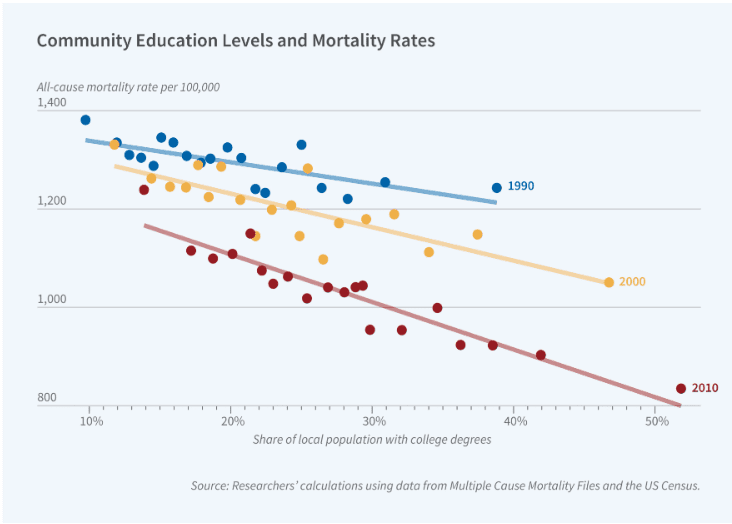Impact of Education on Mortality

It makes sense that more educated individuals have lower mortality rates. Better education may improve health literacy. More education can lead to higher income and and more employee health benefits (with better insurance coverage). However, does living in communities with more educated individuals impact mortality separately from whether an individual’s family is highly educated?
According to an NBER working paper Bor et al. (2024), the answer is ‘yes‘.
The authors use a variety of data sets to reach this conclusion including mortality data from
National Center for Health Statistics (NCHS) Vital Statistics; and educational attainment data by county from the US Decennial Census and the American Community Survey. Using these data, they find the following:
The researchers first evaluate the hypothesis that this correlation reflects healthier people disproportionately moving to more educated areas. They reject this hypothesis, demonstrating that migration patterns are similar for healthier and sicker people.
Second, they examine differences in health-harming behaviors between areas with more and less educated residents. They focus on two key behavioral risk factors: smoking and obesity. Nearly 60 percent of the correlation between area education and health is explained by differences in smoking and obesity. Adults in more educated areas are less likely to be obese, less likely to begin smoking, and more likely to quit smoking in their 30s or 40s than equally educated adults in less educated areas. The researchers argue that local differences in attitudes, beliefs, social norms, and policies — such as workplace smoking bans — are plausible mechanisms for these patterns.
Finally, they explore the role of local amenities in more educated communities, including less pollution, lower crime rates, and higher-quality medical care. They conclude that these local amenities do mediate the correlation between education and health, but explain no more than 17 percent of the correlation. While they acknowledge that there are many environmental factors that are not measured in their data, they argue that observable environmental factors play a smaller role than behavioral risk factors in explaining this striking correlation.
https://www.nber.org/bh/20242/why-do-more-educated-communities-have-better-health-outcomes
The full paper is here; the NBER Bulletin on Health summary is here.



